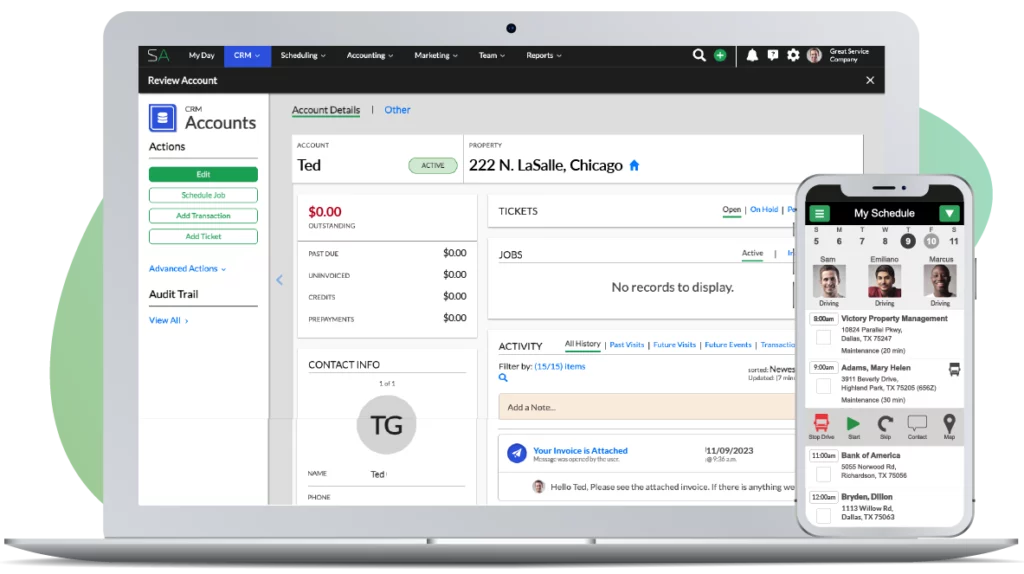How To Make Selling To Commercial Customers Much Easier…
Watch this video to learn the 1 simple trick…
This one concept will greatly simplify selling commercial work to large companies.
This tip will make marketing and selling to commercial clients so much easier. I am constantly asked questions about selling to commercial clients. There’s a huge intimidation factor. It almost feels, to many, like this giant unknown. How in the world do I do this? How in the world do I approach it? I’m going to give you one single concept in this video. It’s a mindset concept, but it’s critical to your success in selling and marketing.
The reason why I feel that I can actually answer this question is, for years, I was a partner in a commercial cleaning company. The only thing we did was sell to commercial clients. Not little commercial clients. Massive corporations. That was our focus. That was our niche. Some were public companies, some were privately owned, and some were owned by holding companies.
The point is that we had to get through all the layers of management to sell. That’s quite intimidating. Our clients all had properties all over the United States. Many had basically a footprint in almost every state within the United States. Again, huge companies.
Also, in the landscape business, I’ve had experience in selling to commercial properties. In this business, I’ve had to sell to smaller properties, property managers, HOAs, condominiums, bigger companies, and things of that sort.
Let me give you the key that makes it all so much easier. When you drive through your local market and you see the mall, and you see apartment complexes, and HOAs, and you see the big, multi-tenant buildings, and the multi-story buildings, and you look at that, at some point you decide that you want your lawn care company to land that property and all the maintenance needs surrounding it.
You’re picturing that outdoor building. Somewhere within that property is a guy that’s in charge. Let’s give him a name. Let’s say his name’s Larry. Or, the same could be true, you’re selling to Starbucks. Starbucks is this massive, somewhat faceless corporation that’s all over the world. There’s a Larry somewhere in Starbucks. There’s a Larry somewhere in this big six-story building.
Larry is not that different from you. Larry’s married. He’s got a wife. He’s been married for a number of years. He’s got two cars. He has a mortgage payment. He probably has a mortgage on at least one of his cars. He’s got a couple kids. One of his kids plays sports. Maybe one plays a musical instrument.
They really want to take a big vacation this year. They’ve got a mother-in-law that is ill that they’re helping to care for. He’s got some brothers and sisters that live in other states that they don’t see very often. He goes to church. He’s usually really busy on Sundays, and Saturdays are all about doing chores around the house, and doing the family thing, and going to all the kids’ sporting events. Then Monday through Friday, it’s back at the grind.
Then, Monday through Friday, when he’s at work, he’s got stresses. He’s got a boss. He’s got all these employees that cause him some headaches. He’s got things that are falling through the cracks. He’s feeling ridiculous pressure, because everybody’s giving him too much work. Everybody wants one more thing. He’s got to sit through one more Monday meeting. He’s got to answer one more stupid question from the boss that he halfway feels might be slightly incompetent.
You can just imagine what goes on in Larry’s life. It’s just like everybody else. There’s all this junk going on. He wants his life to be simpler, better, easier. He wants his work life to be better. He wants to get all kinds of nightmares out of his job. If he could get them out of his job, things would be better.
I’m painting a long, detailed picture, but you’ve got to think about your client this way. If you focus on dealing with Larry and not Starbucks, or the HOA, or the six story building, it’s so much easier to imagine selling to this person.
It’s so much easier to imagine putting together a 12-month marketing campaign where you’re mailing things to him and following up with phone calls to him. It’s so much easier to take a personal approach in both your conversation and in your marketing when you’re talking to Larry. Larry’s not that much different than you, or maybe not that much different than some of your friends that are very close friends. When you picture it that way, you can get in the door so much easier. You can make your marketing work.
For example, if you’re sending a marketing piece to Starbucks, how do you write that? A lot of people write it as, “Hey Starbucks, we’re great. We’re wonderful. We’ll guarantee your satisfaction. You’ll love us. Do business with us here at Total Landscape. We’ll solve all of your needs.” That’s boring. That’s corporation-to-corporation speak.
If your marketing is personal … and imagine that you find out who Larry is, and you find out that his son loves baseball, and Larry played baseball all the way through high school … what if you initially send Larry a FedEx letter? It’s something personal, something that you wrote directly to him. It has your name on it. It’s Jonathan, in my case, writing a letter to Larry about how we can make his life better. It’s written in a personal tone, not a corporate-speak, business-speak tone.
Then, you follow up with a phone call. Of course you get his voicemail, so you leave a nice message. Then next month, you follow up with a lumpy package, maybe a box. Inside that box, there’s a baseball, and it’s got a signature from somebody that is a popular baseball player, maybe in the local minor league market. Then later, you can send him a ticket or two to the local minor league game. I’m might be giving you a bigger example than what you’re willing to spend money on, but it’s that kind of a concept.
What are you doing here? You’re now marketing to Larry. I’m doing something personal. We’re connecting on a personal level. Corporations don’t matter. The corporate level doesn’t matter. We’re connecting as people with common interests. That’s how I get Larry’s attention, because the other 20 guys that are trying to get his attention are using all this business-corporate speak.
In our commercial cleaning company, we grew that company 100 percent with relationships. We took guys to baseball games. We gave them football tickets to games in their local market. We flew them out to trade shows. It was very common to have trade shows in Vegas, so we’d fly some of our clients out to Vegas. We’d buy them dinner. We’d take them to shows. We sponsored their kids’ baseball games. We did a million different things, because it was all relationship-based stuff. The conversations all started, and we worked all conversations to get in the door. We tried to turn those into personal relationships.
Sometimes they didn’t turn into personal relationships. Sometimes we got the business because we had a personal relationship with somebody else who highly recommended us to their coworker that managed another property. Maybe we never developed a great personal relationship with them, but the core personal relationships through these companies are what got us in the door. Your core relationships with your property management company, or the person at the property management company, are going to spread you through the property management company, or at least give you the opportunity to bid a lot of work.
The key to everything is to think in terms of a person. When you’re writing a marketing piece, you are imagining a person and what their life is like, and what their day looks like, and what their weekend looks like. You’re writing something from you to that person. You’re imagining them. Imagine your closest friend, if you were sitting down writing them a letter, and trying to get them to use your service. How would you talk to them? It’s totally different than how you would talk to Starbucks. This completely and dramatically changes your marketing.
Then, the same is true with the person selling. When you walk in the door and you’re trying to meet with someone, it’s far less intimidating when you’re thinking about that one person and not the company. Yes, Larry works at this big, giant company, Starbucks, but honestly, Larry’s life isn’t exactly as exciting as it may seem. Larry goes home and has all the exact same problems that everybody else has. Yes, he works at this giant company, and maybe he’s the big purchasing manager or the facilities manager, or maybe he’s got a C-level title. Who knows what the case is. But, at the end of the day, he’s a guy. He just happens to have done the work to be running the business. He’s still a guy with all the same stresses and concerns.
When you think about it that way, dealing with him is so much less intimidating. The idea of asking for the opportunity to talk to them, the idea of mailing something to them, the idea of following up with them is much less intimidating. You’re just following up with some guy. He’s not super special. He’s just some guy.
Think about everything from that direction. I think in your mind, it will simplify this task of breaking into the commercial market. It will simplify getting commercial accounts. Then, it will guide the way you speak, and talk, and present, and act. The relationship of it all is how you grow this business. That’s why it’s an investment. You don’t suddenly start a commercial business, and tomorrow have 10 million dollars in commercial work. You make an investment in people, an investment in relationships. It starts out slow, and if you work those and invest, in time, the whole thing blows up into this big company.
The very, very, very best sales guys have a network of relationships that they have spent an incredible amount of time developing that they can go back to. That’s why, in the commercial business, when you’re hiring commercial sales guys, you have to get the guy that has the relationships. You go get him. He’ll cost you a lot of money, but he will grow you far faster than the guy that’s just starting out, that’s never done it, that doesn’t know anybody, because he has no network. He has no relationships. You have to build that. This is how you build it. Good luck.



